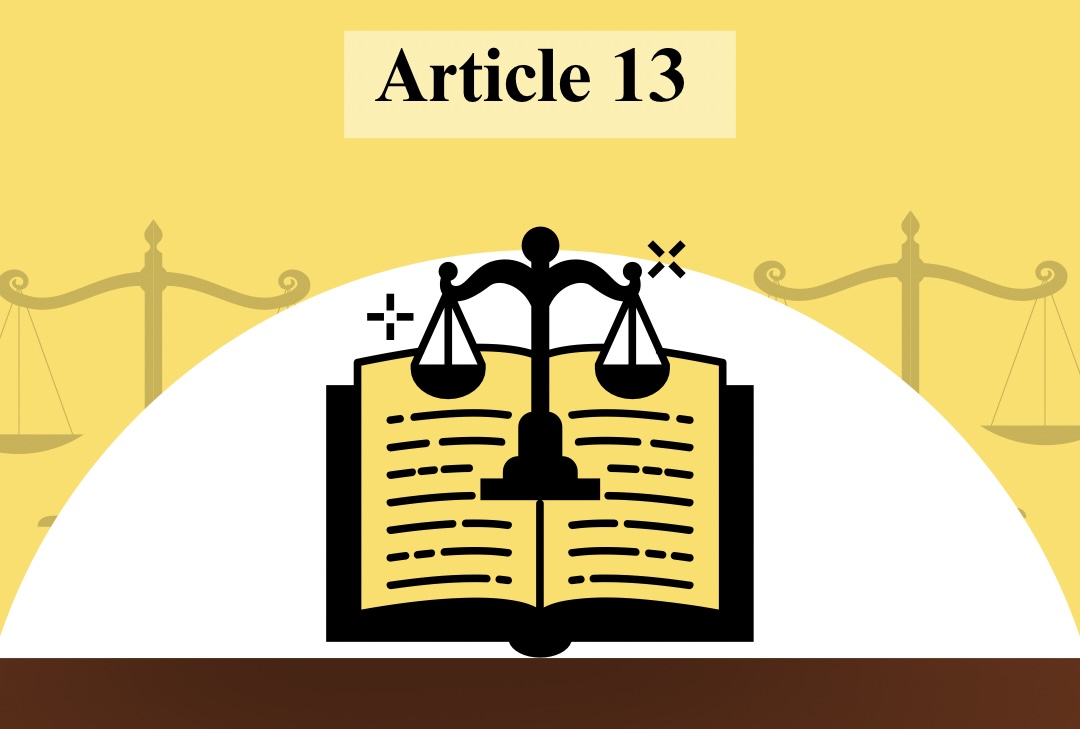
Article 13
Laws Inconsistent with or in Derogation of the Fundamental Rights
Article 13 : Laws Inconsistent with or in Derogation of the Fundamental Rights
- laws in force in the territory of India immediately before the commencement of this Constitution, in so far as they are inconsistent with the provisions of this part, shall, to the extent of such inconsistency, be void.
- The state shall not make any law which takes away or abridges the rights conferred by this part and any law made in contravention of this clause shall, to the extent of the contravention, be void.
- In this article, unless the context otherwise requires law includes any Ordinance, order, bye-law, rule, regulation, notification, custom or usage having in the territory of India the force of law; Laws in force includes laws passed or made by a legislature or other competent authority in the territory of India before the commencement of this Constitution and not previously repealed, notwithstanding that any such law or any part thereof may not be then in operation either at all or in particular areas.
- Nothing in this article shall apply to any amendment of this constitution made under article 368.
Doctrine of Eclipse
Doctrine of Eclipse
Article 13 (1) of this part provides that all laws in force in the territory of India immediately before the commencement of the constitution, in so far as they are inconsistent with the provision of this part shall to the extent of such inconsistency be void.
Explanation Purpose
Explanation
Before the commencement of the constitution if any law has been made which is against the fundamental rights then it will eclipse, that inconsistent clause will be void in nature and not the whole law. The Doctrine of eclipse has been held to apply to pre-constitutional laws as well as the post-constitutional laws.
Case Law
Bhikaji V Madhya Pradesh
In case of Bhikaji V Madhya Pradesh the doctrine of eclipse was discussed by the Supreme Court, it was stated that any law passed before the commencement of the Constitution if it violates the fundamental rights then such a law is void and is not enforceable, also has no legal force and a court takes no notice of it.
Doctrine of Severability
Doctrine of Severability
Article 13 (2) of this part states that a restriction is imposed on the power of the state not to make any law which abridges or violates the fundamental rights given in part III of the Constitution. This article states that a law is void only to the extent of the inconsistency or contravention with the fundamental rights.
This means that a act may not be void as a whole but only a part of it may be void and if that part is severable from the rest of the provisions of the act then the rest of the provisions being valid continue to stand and remain operative.
Explanation Purpose
Explanation
State cannot make any law that takes away or abridges the fundamental rights. After the Constitution if the parliament or the state makes any law which infringes the fundamental rights or reduces them in any manner then that very part of that law will be cut off “doctrine of severability” this very law will not be valid. It simply means that those provisions which are violative of the fundamental rights are void and the rest of the provisions separated from them then are valid.
Case Law
A.K Gopalan V State of Madras
In the landmark case of A.K Gopalan V State of Madras, the Hon’ble Supreme Court stated that in case of repugnancy to the Constitution, only the repugnant provision of the impugned act will be void and not the whole of it and every attempt should be made to save as much as possible of the act.
If the omission of the invalid part will not change the nature or the structure of the object of the legislature, it is severable. It was held that except Section 14 all other sections of the The Preventive Detention Act, 1950 were valid and since section 14 could be severed from the rest of the Act, the detention of the petitioner was not illegal.
Unconstitutionality
Unconstitutionality of Statute
- Statutes which are violative of the fundamental rights are unconstitutional in nature, Article 13 provides for judicial review of all the legislation in India may they be of the past as well as the future.
- This very power has been bestowed upon the High Courts under Article 226 and the Supreme Court under Article 32 of the Constitution of India, which can declare any law unconstitutional if it is inconsistent with any provisions of Part III of the Constitution.
- Judicial review is simply the power of courts to pronounce upon the constitutionality of the legislative acts which fall within their normal jurisdiction to enforce and the power to refuse to enforce such as they find it to be unconstitutional in nature and hence it is void.
- In the landmark case of Keshavananda Bharati, it has been clearly held that judicial review is the basic feature or structure of the Indian Constitution and hence it cannot be destroyed or damaged by amending the Constitution under Article 368.







